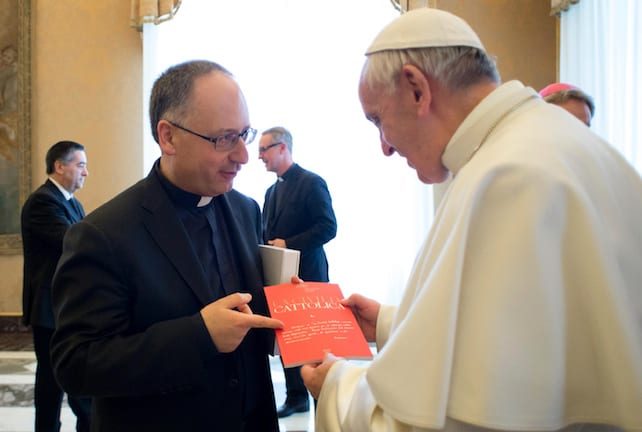A controversial article published by the Italian Jesuit-affiliated “La Civilta Cattolica” has many American evangelicals incensed and has prompted President Trump’s evangelical advisory board to request a meeting with the Vatican.
The article is called “Evangelical Fundamentalism and Catholic Integralism: A Surprising Ecumenism” and was written by Antonio Spadaro and Marcelo Figueroa. Spadaro is an Italian priest and the editor in chief of “La Civilta Cattolica.” Figueroa is an Argentine Presbyterian pastor and the editor in chief of L’Osservatore Romano. Both have connections with Pope Francis.
Published on July 13, 2017, it quickly drew the attention of the American church at large due to the author’s connections with the Pope and the sheer range of accusations it makes against evangelical fundamentalism.
If you’re wondering what, exactly, the authors mean by evangelical fundamentalism, the article outlines the worldview this group holds, one formed by a handful of principles dating from the early 1900s that have “been gradually radicalized.” The authors cite Lyman Stewart’s 12-volume work “The Fundamentals” as the genesis of this dangerous movement.
Among Stewart’s claims were that America is a nation blessed by God, which will rise and fall (economically, militarily, etc.) based on how literally it adheres to the Bible. Historically, this group has called out movements such as the black civil rights movement, the hippy movement, communism, the feminist movement, and presently Migrants and Muslims, as being antithetical to its aims. This group thinks of America as a Promised Land, one that must be expunged of foreigners and then defended—a view that is justified by a literal reading of the Old Testament accounts of Israel doing the same things to carve out a nation for itself.
Followers of fundamentalism include the likes of Ronald Reagan and George W. Bush.
A second main influence on the fundamentalist evangelicals has been the work of Pastor Rousas John Rushdoony, the father of “Christian reconstructionism” or “dominionist theology.” Essentially, Rushdoony’s philosophy marries religion and politics, calling for the submission of the state to the Bible. The authors compare this thinking with Islamic fundamentalism and the driving force behind jihadism. Due to this similarity, the authors state, “It is not just accidental that George W. Bush was seen as a ‘great crusader’ by Osama bin Laden.”
Followers of Rushdoony’s philosophy include Steve Bannon, the Chief Strategist in President Trump’s administration.
Briefly, these are the concerns the authors see with American fundamentalist evangelicals:
An obsession with guns and war
The author states some pastors in this movement use Scripture out of context to assimilate war with “the heroic conquests of the ‘Lord of Hosts’ of Gideon and David.” Further, they fail to take into account “the bond between capital and profits and arms sales.”
Refusal to acknowledge climate change
Fundamentalist evangelicals are desensitized to the evidence scientists bring regarding climate change. The group feels that the whole concern is simply ecologists’ attempts to undermine the Christian faith. Their view of creation is a literal reading of Genesis, in which God gave man dominion over the earth and therefore creation is subject to the will of man. Most pointedly on this issue, when fundamentalists hear of natural disasters ecologists attribute to climate change, they understand it to be signs of the impending seven bowls of God’s wrath spoken of in Revelation. This, Spadaro and Figueroa argue, is a consequence of their literal interpretation of Scripture.
The ends justify the means thinking informing global issues
Fundamentalist evangelicals’ view of the world ending in some epic battle between God and Satan, good and evil, skews their thinking around politics, social justice and global issues. “Every process (be it of peace, dialogue, etc.) collapses before the needs of the end, the final battle against the enemy,” the article argues.
The prosperity gospel
The prosperity gospel says “God desires his followers to be physically healthy, materially rich and personally happy.” It has launched many celebrity pastors into fame and fortune as they “mix marketing, strategic direction and preaching, concentrating more on personal success than on salvation or eternal life.”
Next, the article cuts to the chase for American Catholics: There has been an increasing move of Catholics to align with these fundamentalist evangelicals over issues such as “abortion, same-sex marriage, religious education in schools and other matters generally considered moral or tied to values.” What unites these groups is a “nostalgic dream of a theocratic type of state”—a state in which “walls and purifying deportations” rid it of enemies such as Muslims.
This ecumenism between Catholics and fundamentalist evangelicals is different than the ecumenism Pope Francis is trying to achieve, the article states. “His is an ecumenism that moves under the urge of inclusion, peace, encounter and bridges.”
It is unclear what approval, if any, Pope Francis gave for the article. However, as Time Magazine reports, it was approved by the Vatican’s Secretariat of State.
In response to the article, Johnnie Moore, who is a spokesperson for Trump’s evangelical advisory group, sent a request to the Archdiocese of Washington to meet with Pope Francis.
“It’s in this moment of ongoing persecution, political division and global conflict that we have also witnessed efforts to divide Catholics and Evangelicals. We think it would be of great benefit to sit together and to discuss these things. Then, when we disagree we can do it within the context of friendship. Though, I’m sure we will find once again that we agree far more than we disagree, and we can work together with diligence on those areas of agreement,” the letter reads.
As of yet, no response from the Archdiocese of Washington or the Vatican has been made public.

